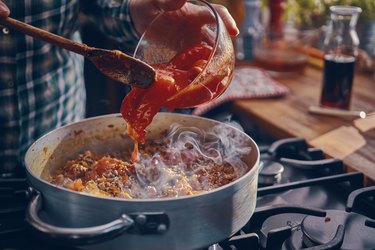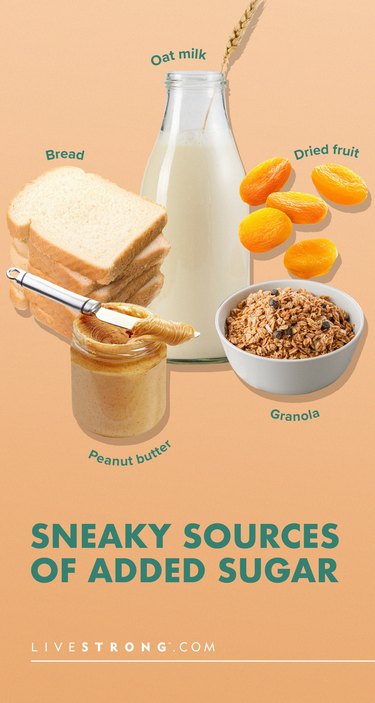
If you're watching your sugar intake, cookies, cakes and soda are probably rarely on the menu. But sometimes it's the foods that don't even have a hint of sweetness that can really push your added sugar intake unknowingly up and over the edge.
And we all need to be paying more attention to our added sugar intake: The average adult eats 17 teaspoons a day, according to the Centers for Disease Control and Prevention. That's simply too much.
Video of the Day
Video of the Day
People assigned female at birth should aim to limit added sugars to no more than 100 calories a day, which is 6 teaspoons or 25 grams, per the American Heart Association (AHA). People assigned male at birth should cap their added sugar at 150 calories each day, which is 9 teaspoons or 36 grams.
Check out this list of surprising foods with added sugar.
1. Marinara Sauce
You weren't too keen about the refined carbs in white pasta, but it's the sauce you need to be mindful of. Many commercial tomato pasta sauces contain added sugars, so look for a tomato sauce that's free of added sugars by reading labels, comparing brands and products within brands.
Ideally, you want to purchase a sauce that doesn't list any form of sweetener — natural or artificial — in the ingredient list.
2. Flavored Yogurt
Yogurt's many benefits include good-for-your-gut probiotics, as well as minerals like calcium, potassium and magnesium. And although yogurt contains naturally occurring sugars — called lactose — most of the flavored varieties are also full of added sugars.
To keep added sugar in check, look for a flavored yogurt with around 10 or fewer grams of added sugar (that's 2.5 teaspoons). Or purchase plain regular or Greek yogurt and toss in your favorite fruits to naturally sweeten it.
Even if you add a sweetener like honey or maple syrup to plain yogurt, most experts agree that what you add on your own will be far less than what manufacturers add to flavored yogurts.
3. Ketchup
"We don't realize that condiments are a really big source of added sugars. Adding just a tablespoon of ketchup to your burger could deliver a teaspoon of added sugars," says dietitian Karen Ansel, RDN.
Look for ketchup without added sugars listed in the ingredient list. You can also pick a brand that lists the sweetener toward the end of the ingredient list, which indicates not much sugar has been added (because food ingredients are listed in order of their abundance in the recipe from high to low).
4. Barbecue Sauce
This is another condiment that can be laden with added sugars. "A tablespoon of barbecue sauce could deliver 1.5 teaspoons of added sugars," Ansel says. That means half of the serving of your barbecue sauce is added sugar.
It's unrealistic to expect to find a barbecue sauce that's free from any type of sweetener. Instead, compare ingredient lists and choose one where the sweetener is as low down on the ingredient list as possible.
5. Kombucha
This is a great example of a seemingly healthy food (and it still is thanks to those probiotics!) that can sneak in added sugars unexpectedly.
While the kombucha-making process requires sugar (the yeast feeds on sugar, which helps create those gut-healthy probiotics), many brands add way too much. Look for one with less than 10 grams of sugar per serving.
6. Plant-Based Milks
Between the refrigerated section and the center aisles of your grocery store, there are so many non-dairy "milks" to choose from. And often they contain some type of sweetener — even when they're labeled "original" or "no added sugars."
If added sugar is of concern, your wisest purchase is a plant milk labeled "unsweetened." Or, compare ingredient lists for one with no added sweetener.
Related Reading
7. Packaged Fruits
Fruit cocktail, canned peaches, even applesauce can have sugar added to them. For whole, chopped and diced fruit, it's often in the form of a sugary syrup; in pureed fruit, such as applesauce, it could be any type of added sweetener like cane sugar or fruit juice concentrate.
Look for packaged fruit that says "no added sugar;" however, these are sometimes sweetened with sucralose or other artificial sweeteners, so read the label if you are trying to avoid those ingredients. Or, read the ingredient list and ID one that is just fruit packed with its own juice or water.
The same goes for the dried varieties: You might expect dried cranberries or dried tart cherries to have some added sugar in them — after all, in their raw state they are, well, tart. But added sugars also lurk in dried fruits like pineapple, mango and banana.
Your best bet is to read the ingredient list and, in an ideal world, pick one that doesn't have any added sugar.
8. Broth and Stock
This one was perhaps the most surprising to us! First, you can't really detect any sweetness in a stock or broth. Second, when you make your own broth at home, you don't usually add sugar so it's a very unexpected ingredient.
Be mindful of bullion, too: many bullion brands also included added sugars.
9. Enhanced Waters
Souped-up waters are not only often spiked with electrolytes or energy-boosting ingredients, they are typically loaded with added sugars, too.
A 20-ounce bottle of a Vitaminwater, for example, has around 27 grams of added sugars, or nearly 7 teaspoons. If you want more flavor than plain ol' water, look for fruit-infused flat or sparkling waters like these flavored water brands or make your own at home by adding citrus or a splash of 100 percent fruit juice.
10. Bacon
In sodium-rich foods — such as bacon — adding sugar boosts flavor. As a result, most of the bacons you'll see in grocery store coolers have sweeteners added. Nowadays, though, some brands offer bacon without added sweeteners.
But just because it's not labeled that it's free of added sugars doesn't mean they weren't left out: Scan the ingredient list to see if this breakfast meat contains sugar.
11. Granola
It sounds like a health food, but granola is almost always sweetened with added sugars like corn syrup, honey or brown sugar. Plus, some granola comes with chocolate or sweetened dried fruit, which add even more hidden sugars.
Compare brands and flavors within brands and choose a granola with the least amount of added sugars. Or you can get the same crunchy goodness from crumbling plain whole-grain cereal and mixing it with some chopped nuts, suggests Ansel.
12. Peanut Butter
Eating peanuts is linked to a longer life, per a May 2015 study in the journal JAMA Internal Medicine. But, unfortunately, some peanut butters — even the ones touted to be "all natural," and especially those marked "reduced fat" — are a sneaky source of added sugars.
To maximize the health and nutritional offerings of peanut butter, it should have one ingredient: peanuts. And maybe a little salt. That's it.
13. Bread
While you may know that jam on your toast has added sugars, you might not realize the toast itself is a culprit. Yes, some sugar is formed naturally in the bread-baking process, but it's often added too.
"Choose a bread with 1 gram of sugar or less per slice," says dietitian Misti Gueron, RDN. "I recommend whole-grain, sprouted breads without honey, or any other sugar, such as Ezekiel bread."
14. Packaged Oatmeal
A heart-healthy and fiber-rich way to start your day, oatmeal is a top choice for a power breakfast. And while you can control how much honey or syrup you drizzle on at home, many flavored packaged varieties have far more added sugars than you realize.
For example, one packet of Quaker Instant Oatmeal in Apples and Cinnamon contains 8 grams added sugar (and 11 grams total), which is a full two teaspoons of sugar.
Similar to yogurt, compare brands and flavors and purchase a variety with the least amount of added sugar. Or, better yet, choose plain oatmeal packets and top with fruits like berries, sliced peaches or diced apple and cinnamon.
15. Flavored Coffees
Nearly 68 percent of coffee drinkers sip their java with some type of add-in, such as sugar or other sweeteners, per a May 2017 report in Public Health. And over 60 percent of the calories in the participants' beverages came from added sugar.
So odds are you're adding to your daily sugar count starting with your a.m. coffee — unless you drink it black, of course. That said, if drinking black coffee sounds unbearable, try a splash of whole milk, heavy cream or your favorite plant-based alternative to give your coffee a more decadent feel sans so much sugar.

- CDC: "Get the Facts: Added Sugars"
- AHA: "Sugar 101"
- FDA: "CFR - Code of Federal Regulations Title 21"
- Vitaminwater
- JAMA Intern Med: "Prospective Evaluation of the Association of Nut/Peanut Consumption With Total and Cause-Specific Mortality"
- Public Health: "Consumption of coffee and tea with add-ins in relation to daily energy, sugar, and fat intake in US adults, 2001–2012"